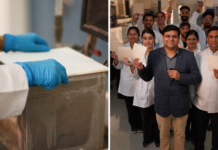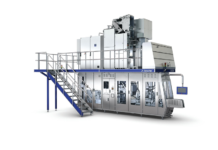Saudi Arabia-based Sabic, a chemical manufacturing company, has launched a sustainable packaging solution for frozen food, which combines a new polyethylene (PE) grade with innovative film production technology. Compared to conventional blow PE film solutions, it claims to offer significantly higher throughput. It has the potential for down-gauging, making it attractive from both a commercial and sustainability standpoint.
Sabic is a global leader in diversified chemicals headquartered in Riyadh, Saudi Arabia. The company manufactures globally in the Americas, Europe, the Middle East, and the Asia Pacific, making distinctly different kinds of products such as chemicals, commodity and high-performance plastics, agri-nutrients, and metals.
The TF-BOPE film is based on Sabic LLDPE BX202 grade, which is available globally. TF-BOPE stands for Tenter Frame Biaxially Oriented Polyethylene. This is a PE grade that can run in tenter frame machines traditionally used to make Biaxially Oriented Polypropylene (BOPP) film. TF-BOPE has the potential to be used in new applications and markets which support the circular economy, where mono-material solutions are required to enhance recyclability. TF-BOPE can replace multi-material laminates into a mono-PE structure.
Sabic said that its new solution is based on a mono web TF-BOPE film structure with a thickness of only 20 micrometers – an unprecedented benefit in this market. This thin gauge provides a potential packaging material reduction of approximately 35 to 50% compared to the incumbent blown PE film. The reduced thickness of the packaging solution minimizes environmental impact and supports brand owners and retailers aiming to reduce their packaging material consumption. The new packaging solution is also 100% recyclable and fits mono-PE recycling streams.
This packaging solution for frozen food is the result of Sabic’s close collaboration with film suppliers or extruders Ticinoplast and Plastchim-T and packaging machine manufacturer Syntegon Technology.
Stephan Eltink, Sabic’s business director for PE in Europe, said, “At Sabic, we focus on delivering sustainable solutions and working collaboratively with our customers to help them achieve their ambitions and solve key industry challenges. By working closely with Ticinoplast, Plastchim-T and Syntegon, and by leveraging our innovation together, we have been able to introduce a new solution to the market that allows for more sustainable packaging without any compromise on productivity and consumer convenience.”
Pierre Hamelink, Syntegon’s director of Business, Market and Sustainability Strategy, said, “This innovative packaging solution demonstrates the true value of collaboration. Stakeholders throughout the supply chain have had to work together to bring this to life — sustainability cannot be achieved single-handedly.”
He added, “Our research and development efforts are driven by our mission to deliver sustainability – without compromise. Our new PHS 2.0 sealing technology can process thinner films whilst offering the same level of sealing quality, product protection and processing speed as conventional sealing technologies. When replacing composite packaging materials on new and existing Syntegon machines with films made of Sabic’s BOPE, brand owners benefit from even more material and cost savings.”
According to Sabic, TF-BOPE film made of Sabic LLDPE BX202 material offers tear direction, and low tear strength provides an easy unidirectional opening. Compared to conventional solutions, it offers much better visibility of packaged products due to higher light transmission and lower haze. Meanwhile, the high gloss delivers first-class design and aesthetics.
Sabic said that the 20-micrometer thin film was successfully tested on Syntegon’s vertical form, fill and seal machines, which feature the newly-developed PHS 2.0 sealing technology. This technology reduces the amount of clamped film by 25% and increases packaging speed by up to 25%. The thin TF-BOPE film also requires less cooling time, which increases packaging speed even more. During the evaluations, a constant speed of 130 bags per minute was achieved.
For packers, TF-BOPE film claims to deliver a robust sealing performance and increased productivity resulting from improved packaging speed. The thin gauge results in increased film roll efficiency, which reduces logistic handling, storage space, and transport costs.
For converters and brand owners, Sabic’s TF-BOPE film material offers a wide range of benefits including good printability, cost-saving opportunities, higher yield, less consumption of plastic materials, and lower packaging taxes to reduced material consumption. It further reduces the package weight to product weight ratio, resulting in more optimized packaging design.
According to the company, Sabic TF -BOPE polymer is part of the “Design for Recyclability” under Trucircle solutions that support easy and full recyclability by enabling mono-PE material structure multilayer tenter frame of flexible packaging, aiming to minimize waste. This new product can also be available as a certified circular polymer from the company’s Trucircle portfolio. At Sabic, the Trucircle initiative encompasses the company’s circular materials and technologies, including certified circular polymers from the chemical recycling of mixed plastic waste and certified renewable polymers based on bio-based renewable feedstock.
IndiFoodBev — authentic, impactful and influential
An English-language food and beverage processing and packaging industry B2B platform in print and web, IndiFoodBev is in its third year of publication. It is said that the Indian food and beverage industries represent approximately US$ 900 billion in revenues which implies more than 20% of the country’s GDP. Eliminating the wastage on the farmside can help to deliver more protein to a higher number of the population apart from generating sizable exports. The savings in soil, seeds, water, fertilizer, energy and ultimately food and nutrition could be the most immense contribution that country is poised to make to the moderation of climate change.
To improve your marketing and grow sales to the food and beverage processing and packaging industry, talk to us. Our research and consulting company IppStar [www.ippstar.org] can assess your potential and addressable markets in light of the competition. We can discuss marketing, communication, and sales strategies for market entry and growth.
Suppliers and service providers with a strategy and budget for targeted marketing can discuss using our hybrid print, web, video, and social media channels to create brand recognition linked to market relevance. Our technical writers are ready to meet you and your customers for content.
The second largest producer of fruit and vegetables in the world is continuously expanding processing capacities and delivery systems with appropriate innovative technologies. We cover product and consumer trends, nutrition, processing, research, equipment and packaging from farm to thali. Get our 2025 media kit and recalibrate your role in this dynamic market. Enhance your visibility and relevance to existing markets and turn potential customers into conversations. Ask for a sample copy of our bi-monthly in print or our weekly IndiFoodBev eZine each Wednesday.
For editorial info@ippgroup.in — for advertisement ads1@ippgroup.in and for subscriptions subscription@ippgroup.in
Naresh Khanna – 10 February 2025
Subscribe Now












